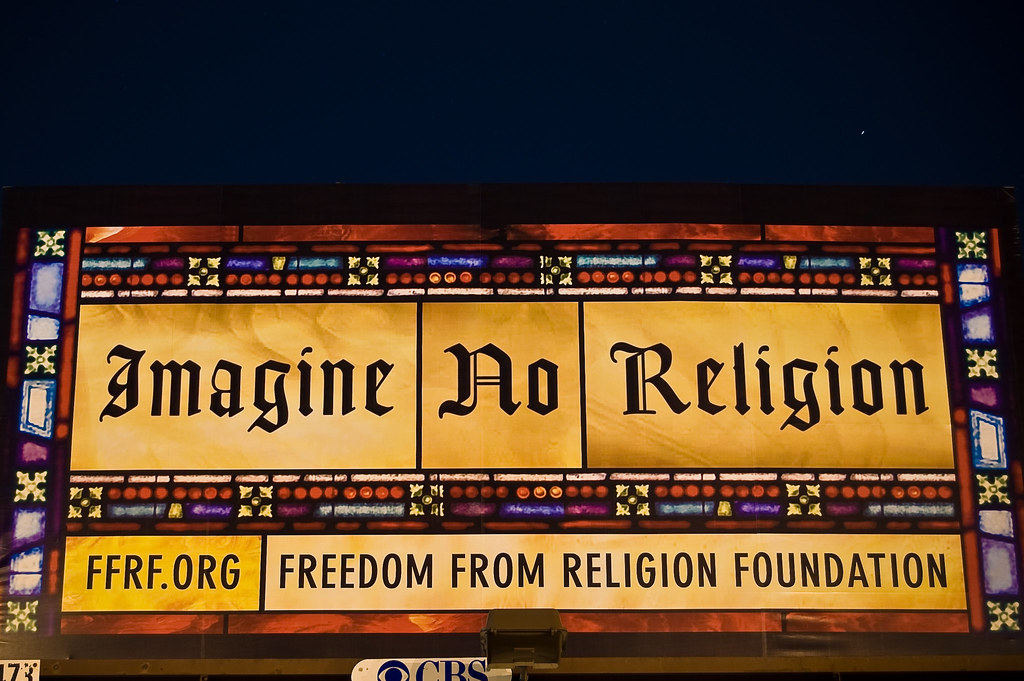In an age of globalization pushed ever faster onward by internet connectivity, in which nuclear and biological weapons are growing abundant and popular, the xenophobia encouraged by most religions is surely a hindrance to humankind. By hating one another as much as our religions are telling us to, we’re coming thisclose to killing ourselves.
Islam and Christianity
At the same time, oppressive, non-rational, theistic religions like Islam and Christianity seem to be growing, putting pressure on the sciences and on the nerves of rational people across the globe. It’s getting a little scary. What gives?
First, “obsolete” has two meanings, and making a distinction between them when discussing obsolescence in religion is very relevant.
In one sense, “obsolete” means, “no longer in general use; fallen into disuse.” Religion most definitely does not fall into this category. In fact, the most notoriously violent religions in the world – Islam, and Christianity – are also the most popular, reasonably adding a chill to many people’s bones.
Christianity, via the “intelligent design movement” (a renaming, but not a rethinking, of Biblical creationism), continually tries to weasel its way into legitimate science classes – and in some countries, like the United States, it is incrementally succeeding! Islam is spreading across the middle east and Africa, too, at an alarming rate. Islam claims 1 to 1.8 billion minds, while Christianity claims 1.5 to 2.1 billion.
On the bright side, the nonreligious group (including atheists, agnostics, and secularists) is in third place and gaining with 1.1 billion – but still, this means more than five-sixths of the world’s population is religious. If religion is growing obsolete in popularity, it’s doing so very slowly.
It is easy to argue that Christianity and Islam are so popular because they have both spread mainly by war, occupation, tyranny, and violence. Faced with the options, “My god or death?” enforced by a knife, only the most stupid of heroes would respond, “Death, please,” no matter what treasured ideal of freedom he or she might hold.
The Catholic Church terrorized the world via European conquests on all the continents in past centuries, though its violence has, by now, been minimized to the regular molestation of children and the mandatory creation of more of them. Christianity is starting to lose power, but its replacement isn’t any better.
 Islam has now taken the stage as the world-famous, violent, oppressive, sexist, racist, abusive occupying force du-jour, and it’s proving itself worthy by hosting well attended lady-stoning parties, marrying children to old men, murdering rape victims as though they were at fault for the crime, butchering little girls’ genitals with dirty instruments, and blowing people up in crowded spaces.
Islam has now taken the stage as the world-famous, violent, oppressive, sexist, racist, abusive occupying force du-jour, and it’s proving itself worthy by hosting well attended lady-stoning parties, marrying children to old men, murdering rape victims as though they were at fault for the crime, butchering little girls’ genitals with dirty instruments, and blowing people up in crowded spaces.
Further, in some of the first-world countries whose occupants have been kind enough to offer Muslims refuge from their culture’s own violence, Islam’s adherents have been pushing to have the Koran’s laws impede the democratic process.
While the world’s two most popular religions aren’t growing obsolete in the first sense, they have surely grown obsolete in the second sense: “of a discarded or outmoded type; out of date.”
The world’s most popular religions
The world’s most popular religions – the Western ones – are most definitely, embarrassingly, excessively archaic. Their teachings encourage categorized, boxed thinking; all contain a method of programming millions and millions of brains to work as slaves to the uncaring and powerful, fueled by simultaneous fear and love of the imaginary beings shoved in the place of honest awe, where they don’t belong. The western religions are memetic credulity machines.
If these religions were all really about peace, love and “finding meaning,” this would merely be a bad thing, rather than a horrifically terrible thing. But, being successful memes, religions are very good at manipulating people into passing them to their children, their friends, and their captives (which are sometimes one-in-the-same) – and they do it by taking away people’s freedom, and often hurting them, either psychologically or physically.
 The more desperate people are, the more willing they are to believe ridiculous things, just in case, those things might be true enough to offer some sort of salvation. And religions, by threating hell, promising heaven, and justifying violence dependent on one’s mere thoughts, are very good at creating comfy nests of desperate terror in human minds.
The more desperate people are, the more willing they are to believe ridiculous things, just in case, those things might be true enough to offer some sort of salvation. And religions, by threating hell, promising heaven, and justifying violence dependent on one’s mere thoughts, are very good at creating comfy nests of desperate terror in human minds.
There is a better way for humanity to live than by the constant defeat and conquest of uncaring, unintellectual ideologies. If people could only think properly if they could only have enough food, water, shelter, books, safety, and respect for their rights, they might learn to give real knowledge – that of reason and the sciences – the resources it needs to keep the positive cycle of abundance growing.
Maybe people did need monotheistic religions Once Upon A Time
Maybe people needed something to believe in, something to make the injustices of the world seems to make sense. On the other hand, maybe dictators, unwilling to sacrifice their power to the more subtle and effective workings of systems which supported their people’s needs, selfishly devised a good excuse to keep making war and killing everyone’s sons: “I work for God, and so must you.”
Maybe once, religion made sense, but now, it no longer does. It is completely obsolete in the relevance of its illogical teachings; now, we must encourage it to become obsolete in popularity. It’s already harming us, our education, our safety, and our medicine; we need to stop it before its adherents destroy not only themselves but the rest of us too.






